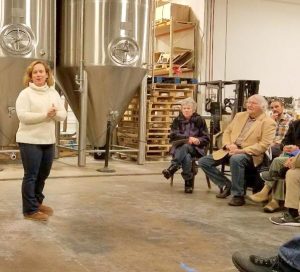 By the end of the evening, a standing room only crowd came to Sanitas Brewing Company to hear how their three state legislators plan to represent their constituents.
By the end of the evening, a standing room only crowd came to Sanitas Brewing Company to hear how their three state legislators plan to represent their constituents.
KC Becker, Senator Steve Fenberg, and Representative Edie Hooton held their first town hall meeting of the legislative session that began on January 10.
Before hearing about bill introductions, attendees heard a presentation by Colorado Research Interest Group (COPIRG) Director Dann Katz who described two areas of consumer protections that the group is currently addressing:
- Credit monitoring
- Arbitration clauses
Citing the Equifax data breech of 2017, Katz encouraged consumers to freeze their own credit to prevent identity theft, “We want you to stop the problem before it happens.” Freezing one’s credit communicates to three credit bureaus – Experiean, Equifax, and ? that no one can access an account or social security number when sometimes during a long stretch of time, an individual is not in need of credit.
Credit freezing though, also prevents the owners of the social security number of accessing their own accounts when needed. In Colorado, a consumer is offered one free occasion to unfreeze and account. COPIRG is working on legislation to afford consumers an unlimited amount of opportunities to unfreeze an account as is currently the case in Indiana, Maine, North Carolina, and South Carolina.
Katz described the problem that COPIRG has with forced arbitration clauses, “The market place is not a level playing field. Consumers are getting taken advantage of.”
COPIRG has monitored arbitration clauses in nursing home contracts, day care centers, cell phone and computer purchases, employers, and housing leases. These clauses protect the company from lawsuits including class action suits by forcing the consumer into arbitration arrangements that often favor the company. “We don’t like arbitration,” Katz explained, “In some cases we’ve seen the company choose the judge or arbitrator. Some require you to fly to a different state for arbitration. There are no real ethical standards.”
But Katz offered relief for consumers in the form of actions that can be taken now. Katz described the Consumer Finance Protection Bureau (CFPB) as the “cop on the beat right now, the federal watchdog.” The CFPB, in operation since 2012 is similar to the Environmental Protection Agency “except [it’s] for consumers.” Although the bureau is at risk of being defunded under the current administration, there are protections that consumers can utilize in the meantime.
CFPB offers Know Your Rights (KYR) information about student loans, mortgage, and information on how to buy a house.
The bureau maintains a complaint data base at consumerfinance.gov that takes complaints and directs the complaint straight to the company in question. The company has 15 days to respond or risk making the list of companies that failed to address complaints. According to Katz, 97% of complaints have received a response, “In a lot of cases, they’re getting it resolved.”
 Senator Steve Fenberg is in his second year representing the 18th Senate District of Colorado. He predicts that bills will live or die in the Senate, “the fight will be in the Senate.”
Senator Steve Fenberg is in his second year representing the 18th Senate District of Colorado. He predicts that bills will live or die in the Senate, “the fight will be in the Senate.”
Fenberg will reintroduce a bill that creates a right to install and use battery systems in homes which he sees as a cost efficient way to preserve energy. Fenberg believes that these battery systems would also improve reliability and efficiency in the case of a power outage. The bill failed last session, but Fenberg conceded that “sometimes it can take a couple of years for a bill to pass.”
Fenberg will also introduce a bill to offer state tuition rates for refugees, “Colorado stands with these people and they are welcomed in our state.”
In attempt to protect the LGBTQ community who are minors, Fenberg will again introduce a bill that would ban licensed mental health providers from engaging in conversion therapy. Despite testimony by multiple mental health professionals, and in addition from children who said they were or would be harmed by such therapy, the bill failed in 2017 on party lines. Fenberg said that the therapy is “well outdated, and is child abuse if you see what actually goes on in these therapies.”
A fourth bill by Fenberg would give election access to more voters. The bill would facilitate registration to those in the criminal justice system. Fenberg acknowledged that those who were incarcerated for a felony sometimes don’t know that they have gotten their voting rights back upon completing all sentence requirements, “Very few register to vote. They don’t know they got their rights back.” The bill would provide education about voting rights, and would encourage these eligible voters to participate in elections.
Before the 2016 election, local groups belonging to the Colorado Criminal Justice Reform Coalition (CCJRC) organized a voter registration drive of those incarcerated who were eligible to vote.
 Representative Edie Hooton has introduced seven bills, two of which defend consumer protection. She hopes to improve the enforcement of regulations that protection mobile and manufactured home owners.
Representative Edie Hooton has introduced seven bills, two of which defend consumer protection. She hopes to improve the enforcement of regulations that protection mobile and manufactured home owners.
Another bill would protect homeowners from mortgage lender abuse and would restrict fees to homeowners for assembling documents necessary to fight a possible foreclosure.
Hooton believes that supporting homeless youth means the reduced likelihood of homelessness in later life. That’s why she’s sponsoring a bill that would address “how we’re serving our homeless youth.” The bill as it reads establishes the task force concerning youth who are experiencing homelessness (task force) to study and make recommendations on issues related to the issue of youth experiencing homelessness in Colorado
In 2016 a statewide ballot measure that would have provided universal healthcare to Coloradans failed, so Hooton decided a bill to evaluate the costs for universal healthcare in advance of another try at universal healthcare for all. The bill directs Housing and Human Services (HHS) to look at costs including breakdowns such as for veterans, “Our healthcare system is completely inadequate.”
 House Majority Leader KC Becker will sponsor bills related to affordable housing, oil and gas, rural broadband, and the Public Employees Retirement Association (PERA).
House Majority Leader KC Becker will sponsor bills related to affordable housing, oil and gas, rural broadband, and the Public Employees Retirement Association (PERA).
Regarding affordable housing, “If we want more, how can the state help with that?” After being approached by the Colorado Coalition for the Homeless, a nonprofit, who communicate to Becker that the tax money that they pay, on the same level of for-profit institutions, the group could redirect to provide more housing. Becker, in her 5th session, would like to take $100 million from a general fund and reallocate it to the Department of Housing to create rental assistance, veterans assistance, and down payment assistance, “People moving here create a strain on housing.”
Becker would like to see the increased reporting of oil and gas spills, “Right now there’s not a lot of mandatory reporting going on.” The Colorado Oil and Gas Conservation Commission (COGCC) has announced a similar rule that is in its development stages and has asked Becker to hold off on her bill, but she expressed that the COGCC rule is not impressive, “Right now the rule that they have isn’t very good. I want more transparency on any spills whether they have an environmental impact, or injuries. A lot of people are interested in creating transparency.”
Becker has been dissuaded from introducing a bill that would address “forced pooling” of natural gas resources on private property, “Right now oil and gas companies can condemn minerals under your own land (split estate). In forced pooling, you can do it willingly, or [gas companies will say] we’re going to force you to do it.”
In trying to add fairness to the process, Becker would like to see owners given more time to negotiate, say the percentage that landowners are paid for the minerals. By law, landowners receive 12%, whereas the going rate is 16%. Becker would like for landowners to know this, and to be told of any procedures, or laws “in plain English.” As the draft of the bill stands, Becker isn’t optimistic, but expressed hope in making some changes this year, “Right now I’m being told it won’t pass. I’m trying to get done what I can get done.
Currently the Public Employees Retirement Association (PERA) has 500,000 employees in Colorado and manage $42 billion in income and payouts. Becker said that the fund is $32 billion in debt and is currently Colorado’s largest liability and that the situation worsens by year, “We’re not taking in as much as we’re paying out. We don’t want to take benefits away from retirees.” Ideally Becker would like to see the fund become more financially sustainable and has reviewed recommendations submitted by PERA along with recommendations submitted by the state, “Right now we are figuring what ones we can get to pass.” Becker’s goal is to see PERA fully funded in 30 years.
Legislators stressed the importance of the November election. Multiple senate seats are up for reelection with enough seats that are competitive enough to give Democrats a majority if 6-7 seats are won.
Senator Fenberg advised, “Pay attention to this session. Who are the people who most vote against the issues you care about?”